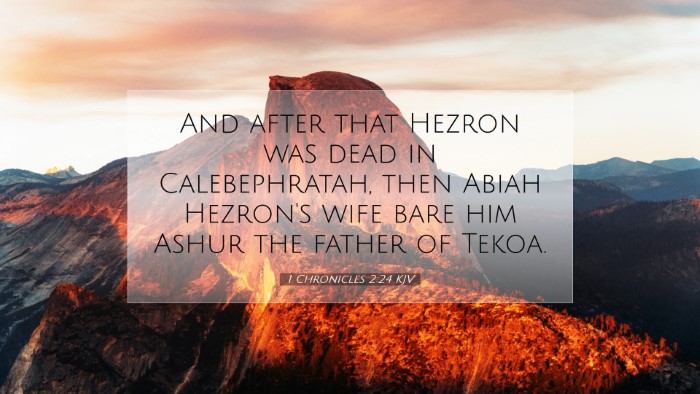Commentary on 1 Chronicles 2:24
Verse Overview: 1 Chronicles 2:24 states, "And after that Hezron died in Caleb-ephratah; then Abijah, Hezron's wife, bare him Ashhur the father of Tekoa."
The Context of the Verse
This verse is part of a genealogical account found in the opening chapters of 1 Chronicles. These genealogies serve not only to establish the lineage of the Israelites, particularly the tribe of Judah, but also to record God's covenant faithfulness through generations.
Genealogy and Its Significance
The genealogies in the Bible might seem tedious, but they reveal profound theological truths. Matthew Henry notes that such records are vital as they link the past to God’s promise. The lineage from Hezron to Ashhur reflects God's covenant with the patriarchs, reinforcing the importance of family and tribal identity.
Hezron and His Legacy
Hezron, the patriarch mentioned here, is notable for being a part of the line leading to King David. Albert Barnes emphasizes that Hezron's death at Caleb-ephratah marks the end of an era, but more importantly, it initiates the continuation of God's plan through his descendants.
Insights from Public Domain Commentaries
Matthew Henry's Perspective
Henry points out that Hezron's death does not signify the end of his influence. Instead, it indicates the transition of blessings to his children. Hezron is celebrated for passing on the covenantal promises. The birth of Ashhur signifies God's continued faithfulness, even amidst life’s transitions.
Albert Barnes on Caleb-ephratah
Barnes provides historical context surrounding Caleb-ephratah, an area known for its fruitful land. He understands this as a metaphor for the productivity of God’s promises that are realized through His faithful servants. Caleb’s name evokes enduring faith, and this location serves as a backdrop to the story of God's enduring faithfulness to Israel.
Adam Clarke's Commentary
Clarke focuses on the familial aspect in this genealogical record. He draws attention to Abijah, Hezron’s wife, highlighting the role of women in the genealogies, which were often male-dominated. This underscores the significance of maternal lines and the integral role women played in the story of Israel.
The Birth of Ashhur
The mention of Ashhur as the father of Tekoa illustrates the continuity of the line and suggests the importance of Ashhur in the development of the tribe of Judah. Clarke further emphasizes that the names and relationships in these genealogies have a purpose: they connect the past with the present work of God among His people.
Theological Implications
From a theological standpoint, understanding the genealogies points toward God's sovereignty and His abiding presence throughout history. The succession from Hezron to Ashhur reflects the unfolding redemptive narrative—showing the reality that God works through families and individuals across generations.
Lessons for Pastors and Theologians
Pastors and theologians are reminded that in the midst of genealogical details, there is the affirmation of God’s faithfulness and the importance of naming and remembering those who have gone before us. This practice fosters community and instills a sense of belonging among the faithful.
Encouragement for Modern Believers
This passage invites contemporary believers to recognize that our legacies and genealogies extend beyond biological lineage. It calls us to be mindful of our spiritual heritage and encourages us to remain faithful stewards of God’s promises in our own lives and in the lives of those we mentor and lead.
Conclusion
The study of 1 Chronicles 2:24 enriches our understanding of God’s work through family lines and the importance of community in God’s redemptive plan. Commentaries from figures like Matthew Henry, Albert Barnes, and Adam Clarke urge readers to see these genealogies not simply as records of names but as a testament to God’s ongoing story with His people—both then and now.


